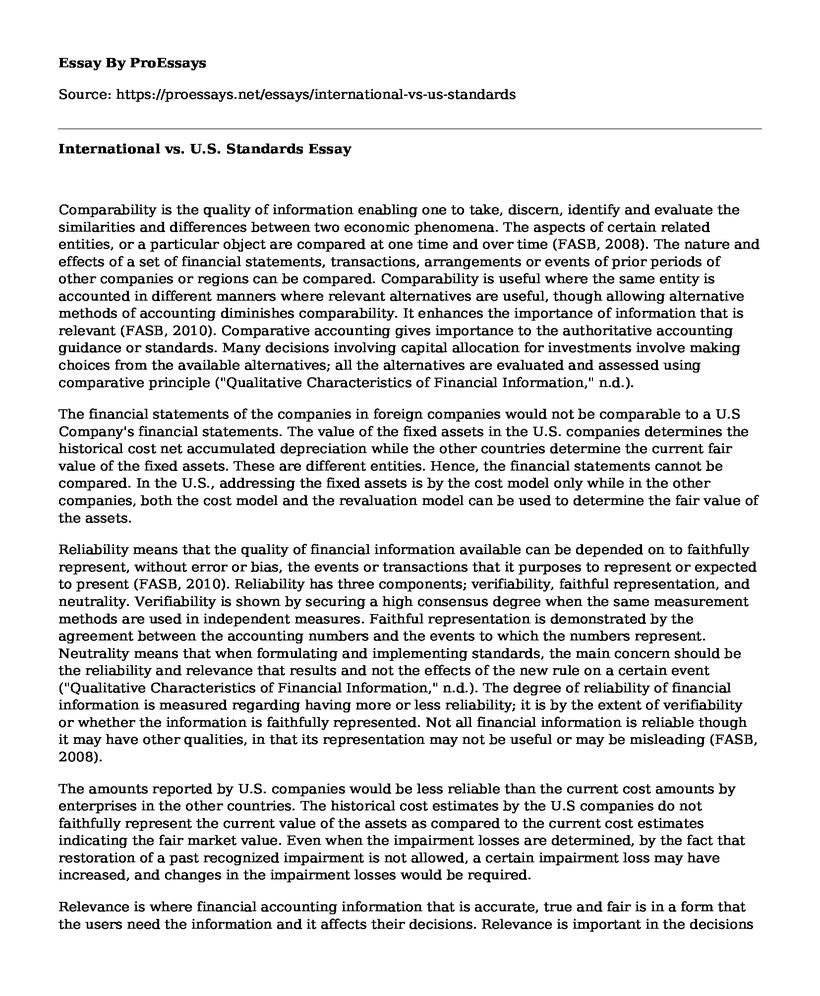Comparability is the quality of information enabling one to take, discern, identify and evaluate the similarities and differences between two economic phenomena. The aspects of certain related entities, or a particular object are compared at one time and over time (FASB, 2008). The nature and effects of a set of financial statements, transactions, arrangements or events of prior periods of other companies or regions can be compared. Comparability is useful where the same entity is accounted in different manners where relevant alternatives are useful, though allowing alternative methods of accounting diminishes comparability. It enhances the importance of information that is relevant (FASB, 2010). Comparative accounting gives importance to the authoritative accounting guidance or standards. Many decisions involving capital allocation for investments involve making choices from the available alternatives; all the alternatives are evaluated and assessed using comparative principle ("Qualitative Characteristics of Financial Information," n.d.).
The financial statements of the companies in foreign companies would not be comparable to a U.S Company's financial statements. The value of the fixed assets in the U.S. companies determines the historical cost net accumulated depreciation while the other countries determine the current fair value of the fixed assets. These are different entities. Hence, the financial statements cannot be compared. In the U.S., addressing the fixed assets is by the cost model only while in the other companies, both the cost model and the revaluation model can be used to determine the fair value of the assets.
Reliability means that the quality of financial information available can be depended on to faithfully represent, without error or bias, the events or transactions that it purposes to represent or expected to present (FASB, 2010). Reliability has three components; verifiability, faithful representation, and neutrality. Verifiability is shown by securing a high consensus degree when the same measurement methods are used in independent measures. Faithful representation is demonstrated by the agreement between the accounting numbers and the events to which the numbers represent. Neutrality means that when formulating and implementing standards, the main concern should be the reliability and relevance that results and not the effects of the new rule on a certain event ("Qualitative Characteristics of Financial Information," n.d.). The degree of reliability of financial information is measured regarding having more or less reliability; it is by the extent of verifiability or whether the information is faithfully represented. Not all financial information is reliable though it may have other qualities, in that its representation may not be useful or may be misleading (FASB, 2008).
The amounts reported by U.S. companies would be less reliable than the current cost amounts by enterprises in the other countries. The historical cost estimates by the U.S companies do not faithfully represent the current value of the assets as compared to the current cost estimates indicating the fair market value. Even when the impairment losses are determined, by the fact that restoration of a past recognized impairment is not allowed, a certain impairment loss may have increased, and changes in the impairment losses would be required.
Relevance is where financial accounting information that is accurate, true and fair is in a form that the users need the information and it affects their decisions. Relevance is important in the decisions made during accounting ("Qualitative Characteristics of Financial Information", n.d.). Financial information makes a difference in the decisions if it has confirmatory value (where it gives feedback, whether confirmation or changes, concerning past evaluations) or predictive value to show the future outcomes. Both values are interrelated where information with predictive value can also have confirmatory value. Knowledge of the past forms the basis of future predictions (FASB, 2008). Relevant accounting information also improves the capacity of the user gives feedback on previous predictions or predicts outcomes. An important aspect of relevance is timeliness as the pertinent information should be available to users before it loses its ability to influence the decisions of the user. Information available when it is no longer needed or long after the events have been reported lacks relevance, and it is not of any use (FASB, 2008).
The quantities reported by U.S. companies for the property, plant and equipment would be less relevant than the current cost estimates by companies in other countries such as England. Presentation of these fixed assets using the current cost estimates after revaluation is more appropriate than using the historical cost net accumulation as current cost estimates are more useful in the making of decisions in the company. Historical cost net of accumulated depreciation is only of predictive value while the current cost estimates indicating the fair value of the assets is of both confirmatory and predictive value.
References
FASB, (2008). Qualitative Characteristics of Accounting Information. Statement Of Financial Accounting Concepts, (2). Consolidated Financial Statements - BrainMass. (n.d.). Retrieved from https://brainmass.com/business/consolidated-financial-statements=1175820900526&blobheader=application%2Fpdf
Financial Accounting Standards Board (FASB), (2010). Conceptual Framework for Financial Reporting; Statement of Financial Accounting Concepts. Conceptual Framework, (8), 16-22. Retrieved from http://www.fasb.org/cs/BlobServer?blobcol=urldata&blobtable=MungoBlobs&blobkey=id&blobwhere=1175822892635&blobheader=application/pdf
Qualitative Characteristics of Financial Information. Statement Of Accounting Concepts, (1035-3631), 8-38. Retrieved from http://www.aasb.gov.au/admin/file/content102/c3/SAC3_8-90_2001V.pdf
Cite this page
International vs. U.S. Standards. (2021, Mar 04). Retrieved from https://proessays.net/essays/international-vs-us-standards
If you are the original author of this essay and no longer wish to have it published on the ProEssays website, please click below to request its removal:
- Paper Example on Taxation in Australia
- How to Commit Fraud? - Essay Sample
- Analytics: The Real-World Use of Big Data in Financial Services
- Paper Example on Possible Economic and Long-Term Impact of Cryptocurrencies
- Steps in the Budget Process - Research Paper
- Auditing Detection Risk for Lemoco Co's Increased Inventory - Essay Sample
- Essay Example on US Budget: Allocating Resources to Take Care of People's Needs







